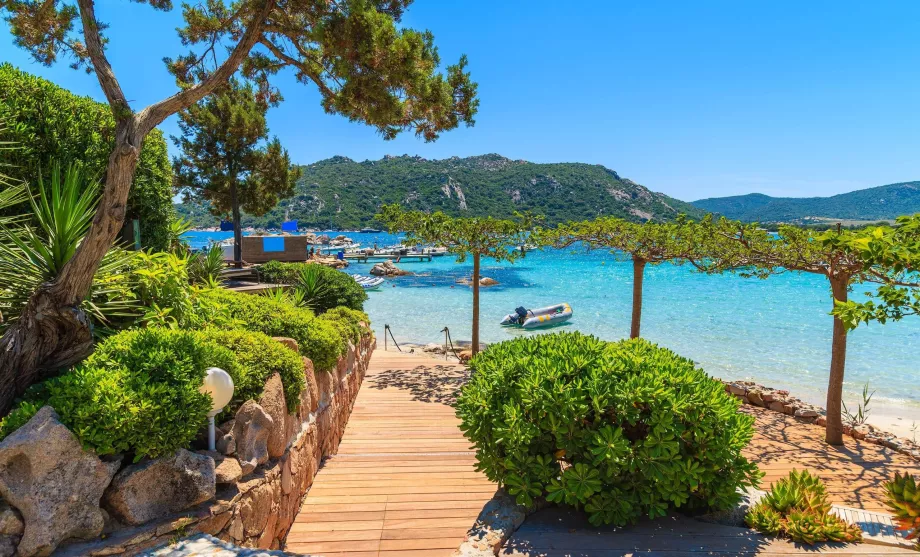Weather in Corsica and best time to go

Corsica's climate is classic Mediterranean with mild winters and hot summers. With increasing altitude, the climate changes considerably, with temperatures dropping rapidly and rainfall increasing. In the mountains, large amounts of snow fall in winter and in some places it lasts all year round.
It should always be borne in mind that the temperature in the middle of the island can be 6-10 °C lower than on the coast.
Corsica's very mountainous terrain means that it is green all year round, and there is always precipitation somewhere on the island, even in the hottest summers.
Compare prices for flights to Corsica
Corsica has all four seasons, although the differences are milder on the coast than at our latitudes.
Winters on the coast tend to be mild with temperatures around 10°C and also very wet and rainy. In the central mountains, large amounts of snow often fall.
Spring and autumn have similar characteristics, with pleasant temperatures of around 20 °C, but autumn tends to be much wetter than spring.
Summers in Corsica are very warm, but the mountain ranges mean that there is often wind or clouds in the sky, making the climate more bearable than elsewhere in the Mediterranean.
Corsica during the year
What are the temperatures in each month and when is it rainiest?
Weather in January
During January, expect average daytime temperatures of around 9°C and frequent rain showers that occur evenly around the perimeter of the island. In the mountains it snows instead of raining, very often from altitudes of around 700 metres.
On the coast, the wind is cold and the weather in January is among the wettest of the year.
Weather in February
February's weather is practically no different from January. Temperatures are still in the low 9°C range, it rains a little less on average, but there are showers at least every third day and snow in the mountains. Above 1,000 metres above sea level, there can be a metre of snow in February.
Weather in March
March is already starting to feel like a Mediterranean spring. Temperatures are rising to 15 °C, the rain is decreasing and there are only occasional showers, although it can rain for days at a time in the mountains and there is still snow in the highest parts of the central mountains.
In any case, mornings and evenings are still very cold and winter clothing should be packed.
Weather in April
April is typically a spring month as we know it in our area. The average temperature is around 17°C and the sun shines for most of the day, but this is often covered by a quick change in the weather with a heavy shower, but it goes away as quickly as it came.
The April weather encourages road-trips to the still deserted sights.
Weather in May
May weather in Corsica is beautiful. Temperatures are rising to a normal 22°C, with showers decreasing significantly and their length shortening. The countryside is beautifully lush green and blossoming after a wet winter and spring, but also invigorated by the sunshine.
May is ideal for cycling or hiking.
Weather in June
June can showcase spring's pleasant temperatures of around 22°C, but summer showers are becoming more common along the coast with temperatures of up to around 28°C. The north-east and south-east of the island are noticeably warmer.
Showers are rare, although showers are always to be expected in the mountains, but they are usually only brief, within minutes.
Weather in July
July is the driest month in Corsica, when rain is very rare and even in the mountains it does not occur regularly. Average temperatures on the coast rise to 27 °C , in the mountains to about 20 °C.
Temperature extremes of over 32 °C are not uncommon, and July is simply the ideal month for a beach holiday.
Book your summer stay in advance
Weather in August
August is statistically the hottest month of the year. Normal temperatures by the sea are around 28 °C, but temperatures above 33 °C are no exception. However, you can always cool off before they reach the mountains, when they rarely rise above 26 °C.
You don't have to worry about missing even one full day. The precipitation mainly comes in the form of evening and night thunderstorms, which can be scary in the mountains but will not affect the daily schedule.
Weather in September
September in Corsica is still the perfect month for a summer holiday. Air temperatures hover around 26°C and the sea cools only very slowly, even towards the end of September it is similarly warm to the middle of summer.
The occasional short shower is to be expected, but it usually only occurs for a few minutes in the evening.
Weather in October
During October, autumn makes its full assault on Corsica. While the first part of the month is often still pure summer, with temperatures between 20 and 25 °C, towards the end of October temperatures drop to 20 °C and there are plenty of showers, especially in the northern and eastern half of Corsica.
Although the rain rarely lasts for a whole day at a time, the chances of getting wet in October are the highest of the whole year.
Weather in November
November is also a very wet month, with frequent showers, cold winds starting to blow from the mountains and regular snow on the highest parts of the hills.
Along the coast, however, temperatures are still a pleasant 16 °C.
Weather in December
December is the first month of winter, but the weather is more like autumn here. Temperatures rarely drop below 13 °C, it often rains and is often cloudy, although the sun is much more common here than in central Europe.
Mountains above 1 000 metres regularly see snow instead of rain.
Table of temperatures during the year
Corsica - Weather similar for the whole island
When to go to Corsica
If you're heading to this island for exploration, spring, late summer and early autumn are ideal times to visit Corsica.
You'll avoid the intense heat of the summer months, as well as the peak tourist crowds. Also, prices are higher during the summer months than in the low season, this is especially evident in accommodation prices.
If swimming is your main goal, then head to Corsica in the second half of June, July or September. Corsica is at its busiest in August, when large numbers of French and Italians arrive for their holidays. This is ideally avoided as it is the most expensive month for all services.
If you want to experience Corsica completely free of tourists, feel free to come in winter if you don't mind a bit of rain and snow. Rental car prices are very low, as is accommodation, although there is a limited supply as many hotels close for the winter. On the other hand, airline tickets are expensive in winter as there are very few connections.
Any questions left?
If you have any questions or comments about the article...

